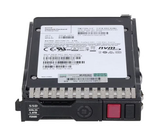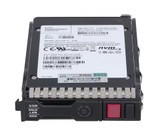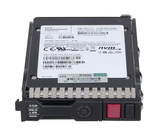HPE Solid State Drives (SSD) for ProLiant Gen10 Plus / Gen11 Servers: Powering Next-Generation Performance
Introduction
As the digital landscape continues to evolve, the demands on IT infrastructure have grown exponentially. Businesses require faster data processing, greater storage capacity, and improved reliability to stay competitive. Hewlett Packard Enterprise (HPE) remains a leader in meeting these needs with cutting-edge storage solutions, particularly through its Solid State Drives (SSDs) designed for ProLiant Gen10 Plus and Gen11 servers. This article delves into how HPE SSDs for these advanced servers can help businesses achieve next-generation performance and reliability.
The Importance of SSDs in Modern Servers
The role of SSDs in modern IT infrastructure cannot be overstated. Unlike traditional Hard Disk Drives (HDDs), SSDs use flash memory to store data, eliminating the mechanical limitations of HDDs. This shift leads to faster data access, reduced latency, and greater durability. For organizations utilizing HPE ProLiant Gen10 Plus and Gen11 servers, SSDs provide a vital component in enhancing overall system performance, enabling the handling of demanding applications such as artificial intelligence (AI), big data analytics, and cloud computing.
Key Benefits of SSDs:
Speed: SSDs offer lightning-fast read and write speeds, significantly reducing data retrieval times and improving application responsiveness.
Reliability: Without moving parts, SSDs are more resistant to physical shock and wear, leading to increased reliability and reduced risk of data loss.
Energy Efficiency: SSDs consume less power than HDDs, which can lead to lower operational costs and decreased heat output in data centers.
Low Latency: With reduced access times, SSDs can handle high-performance workloads, making them ideal for real-time processing and latency-sensitive applications.
HPE SSD Options for ProLiant Gen10 Plus / Gen11 Servers
HPE has tailored its SSD offerings to meet the specific needs of ProLiant Gen10 Plus and Gen11 servers. These SSDs are designed to maximize performance, reliability, and efficiency, catering to a wide range of workloads.
1. NVMe SSDs: The Future of High-Speed Storage
For ProLiant Gen10 Plus and Gen11 servers, NVMe (Non-Volatile Memory Express) SSDs are the top choice. These drives leverage the PCIe interface, offering ultra-fast data transfer speeds and low latency, which are critical for data-intensive applications.
HPE NVMe SSDs: Available in various capacities, ranging from 480GB to 15.36TB, these SSDs are ideal for workloads requiring rapid data processing and high IOPS (Input/Output Operations Per Second).
Key Use Cases: NVMe SSDs are perfect for AI, machine learning, big data analytics, and real-time data processing, where speed and low latency are paramount.
2. SAS and SATA SSDs: Balancing Performance and Cost
While NVMe SSDs offer unparalleled speed, SAS and SATA SSDs remain valuable options for balancing performance and cost, especially in environments with mixed workloads.
HPE SAS SSDs: With capacities ranging from 400GB to 7.68TB, SAS SSDs provide better performance and reliability compared to SATA, making them suitable for enterprise applications that demand high availability and data integrity.
HPE SATA SSDs: These drives offer a cost-effective solution for general-purpose workloads, providing solid performance for tasks like boot drives, web servers, and storage of frequently accessed data.
3. High Endurance and Advanced Features
HPE SSDs for ProLiant Gen10 Plus and Gen11 servers come with several advanced features that enhance their performance and longevity:
High Endurance: Many HPE SSDs are designed for high write endurance, making them ideal for write-intensive applications such as databases and transactional systems.
Data Protection: HPE SSDs include features like end-to-end data protection, which ensures data integrity from the host system to the SSD and back, minimizing the risk of corruption.
Advanced Error Correction: Error Correction Code (ECC) and other advanced algorithms help detect and correct data errors, ensuring reliable and consistent performance.
Thermal Management: HPE SSDs are equipped with advanced thermal management features, ensuring optimal performance even under heavy workloads.
Why Upgrade to SSDs on ProLiant Gen10 Plus / Gen11 Servers?
Upgrading to SSDs on ProLiant Gen10 Plus and Gen11 servers can provide significant benefits that justify the investment. Here’s why businesses should consider making the switch:
1. Enhanced Performance
SSDs, particularly NVMe models, can dramatically boost server performance, reducing latency and improving response times. This is especially important for applications that require real-time processing, such as AI, machine learning, and high-frequency trading.
2. Improved Reliability and Uptime
The lack of moving parts in SSDs reduces the risk of mechanical failure, leading to higher reliability and uptime. For mission-critical applications, this can translate into fewer disruptions and lower maintenance costs.
3. Energy Efficiency and Cost Savings
While SSDs are more expensive than HDDs, their lower power consumption can lead to significant cost savings over time. In large data centers, this reduction in energy use can also contribute to a smaller carbon footprint.
4. Future-Proofing Your Infrastructure
By upgrading to SSDs, particularly NVMe models, businesses can future-proof their IT infrastructure. As applications become more data-intensive, having high-speed storage solutions in place will ensure that your servers can handle evolving workloads without the need for further upgrades.
Considerations When Upgrading to SSDs
Before upgrading to SSDs, it’s important to consider a few factors to ensure a smooth transition:
1. Compatibility and Firmware Updates
Ensure that your ProLiant Gen10 Plus or Gen11 servers are compatible with the SSDs you plan to install. Additionally, updating server firmware to the latest version can prevent compatibility issues and ensure optimal performance.
2. RAID Configurations
If you use RAID configurations in your server setup, verify that your RAID controllers support SSDs, particularly NVMe models. HPE offers RAID controllers that are fully compatible with SSDs, ensuring seamless integration into existing setups.
3. Data Migration
Proper planning and tools are essential for migrating data from existing HDDs or older SSDs to new drives. HPE provides a range of data migration solutions and support to help minimize downtime and ensure data integrity during the transition.
4. Cost vs. Performance
While SSDs, especially NVMe drives, offer superior performance, they come at a higher cost than traditional HDDs. It’s important to weigh the cost against the performance gains, particularly in terms of your specific workload requirements.
Conclusion
HPE Solid State Drives (SSDs) for ProLiant Gen10 Plus and Gen11 servers represent the pinnacle of modern storage technology. With a wide range of options, from cost-effective SATA drives to high-performance NVMe SSDs, HPE provides solutions that cater to the diverse needs of today’s businesses. By upgrading to HPE SSDs, organizations can unlock the full potential of their ProLiant servers, ensuring faster data access, improved reliability, and lower operational costs.
As data demands continue to grow, investing in HPE SSDs for your ProLiant Gen10 Plus and Gen11 servers is a strategic move that will keep your IT infrastructure competitive in the years to come. Whether you’re running AI applications, managing big data, or supporting mission-critical workloads, HPE SSDs offer the performance and reliability your business needs to succeed.
Recent Posts
-
Unleashing Data Velocity: HPE 1.6TB NVMe U.3 SSD Fuels ProLiant Gen10 Innovation
HPE 1.6TB 2.5-Inch SFF NVMe U.3 PCIe x4 Mixed Use SSD for ProLiant Gen10 Servers: A Comprehensi …Apr 11th 2025 -
Powering the Future: The HPE 1.6TB NVMe U.3 SSD – A Speed Symphony for ProLiant Gen10 Servers
Unleashing Speed and Reliability: Exploring the HPE 1.6TB NVMe U.3 PCIe SSD for ProLiant Gen10 …Apr 10th 2025 -
Quantum Leap in Storage: The HPE 1.6TB NVMe U.3 PCIe SSD – Fueling ProLiant Gen10’s Cosmic Performance
HPE 1.6TB NVMe U.3 PCIe SSD: A Deep Dive into Mainstream Performance for ProLiant Gen10 S …Apr 9th 2025




